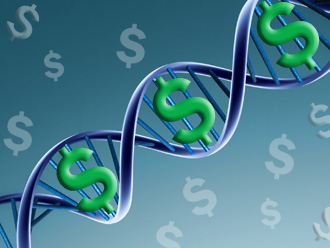Real impact of Supreme Court ruling on gene patents unknown
When the U.S. Supreme Court ruled unanimously that naturally occurring human genes couldn't be patented, some said the ruling will make it easier and cheaper for patients to get tested for disease risk, while others said it will stifle innovation in the biotech industry. In actuality, it will be a while before the results of the ruling are fully known, says Tulane Law School professor Glynn Lunney.

Tulane Law School professor Glynn Lunney says he doesn't think the recent Supreme Court ruling will greatly change the climate in the biotech industry. (Illustration by Tracey Bellina)
The court's decision on June 13 came in a challenge to seven patents held by Utah-based biotech company Myriad Genetics on genes linked to breast and ovarian cancer.
According to Lunney, the reason the impact of the ruling is unknown is because, while the Supreme Court made clear that naturally occurring genes can not be patented, it left intact patent protections on shortened versions of the DNA produced by scientists.
“One possibility is that these remaining patent claims will, as a practical matter, give Myriad the same control over the market for this type of genetic testing as it had before the court's decision,” Lunney says.
If those patents don't protect the company, Lunny expects the short-term effect of the court's decision will be less-expensive genetic testing for certain sequences.
Lunney says that lower prices, while good for consumers, tend to lead to less research and could force companies to keep their research secret, which would make it more difficult for patients to “judge the reliability and veracity of the claims made for the genetic testing that is offered.”
Lunney says he doesn't think the ruling will greatly change the climate in the biotech industry.
“My own sense is that the court's decision will not reduce the effective level of patent protection available to Myriad and other companies much, if at all.”
